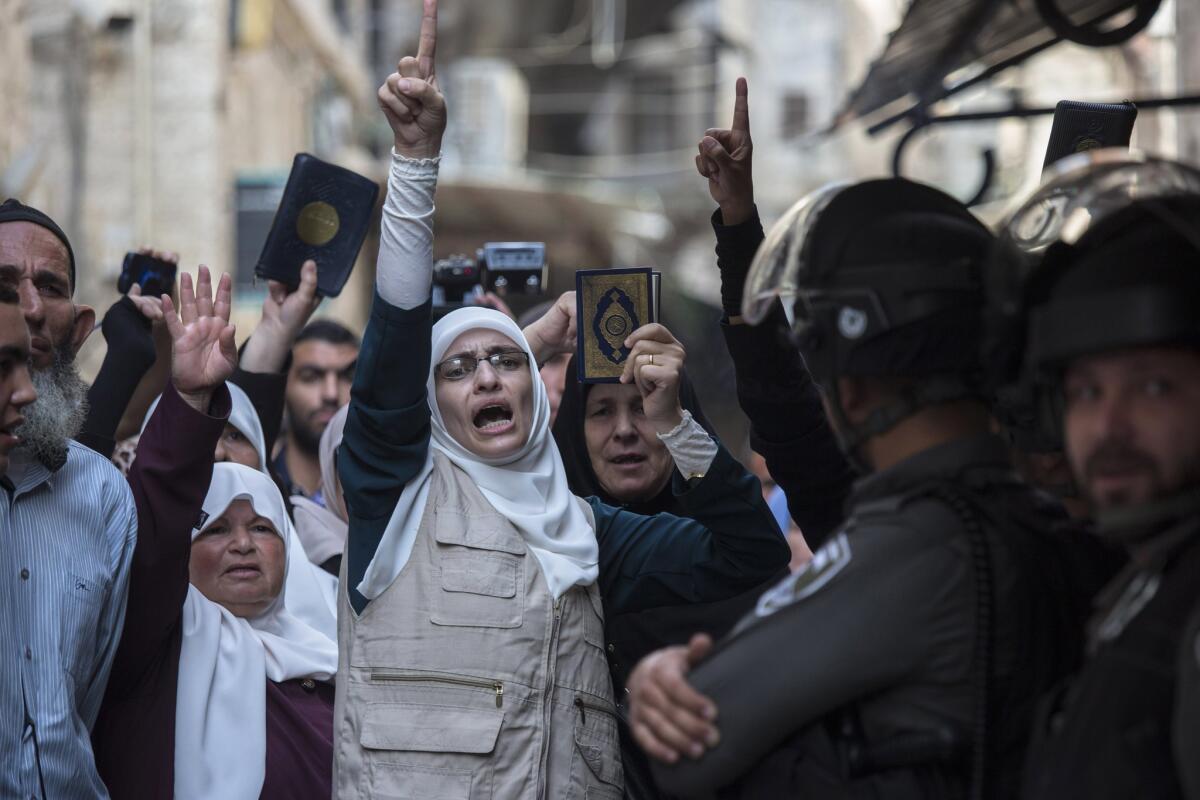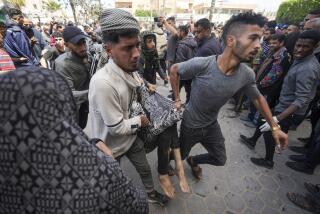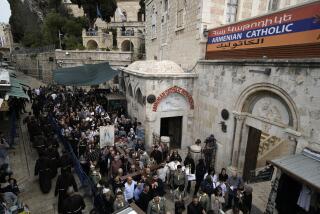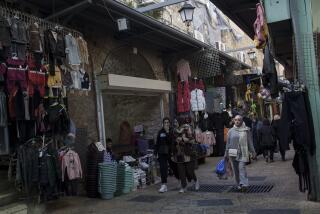20 Palestinians hurt in clashes with Israeli police at Al Aqsa holy site

Palestinians chant slogans during a protest in Jerusalem’s Old City on Sunday.
Clashes broke out Sunday morning between Israeli police and Palestinians at the Al Aqsa mosque compound, leaving more than 20 Palestinians injured and damaging the windows and carpet of the mosque, according to police and Palestinian officials.
The violence occurred after Israeli police allowed Jewish worshipers and tourists to visit the hilltop compound in Jerusalem’s Old City, revered by Muslims as their third holiest site after Mecca and Medina and by Jews as the site of their ancient temple.
Palestinians were preparing to disrupt attempts by the Jewish visitors to hold prayers at the compound to mark the impending Jewish New Year, which began at sunset Sunday. Israeli policies allow Jews to visit the area outside the mosque during specific hours, but forbid them to pray there.
Police had recently shut down the mosque to Muslim worshipers, mainly women, during the Jewish visiting hours to prevent confrontations.
Police spokesman Micky Rosenfeld said Palestinian protesters barricaded themselves inside the mosque early Sunday and threw rocks and firecrackers at police. He said police did not enter the mosque but removed barricades around the building.
There also were reports of a Jewish man in a prayer shawl being attacked nearby.
Police released video showing lit firecrackers and other objects being thrown by Palestinians inside the mosque at the officers outside, with some exploding within the holy site. The Jerusalem police website said pipe bombs were seized near the entrance to the mosque.
The Palestinian Red Crescent said 20 Palestinians were injured, none seriously. No arrests were reported.
Palestinians fear Israel wants to divide the site between Muslims and Jews, allowing only one group there at a time.
Palestinian and Arab officials reacted angrily to the events at Al Aqsa, warning that provocations at the site could spark more violence and extremism in the region.
Palestinian Authority President Mahmoud Abbas issued a statement through his spokesman, Nabil abu Rudaineh, condemning what he called “the Israeli police raid of Al Aqsa mosque and the assault against the worshipers.”
The Islamist movement Hamas also condemned the police measures at the walled mosque.
Hamas spokesman Mushir Masri told a demonstration in the Gaza Strip protesting the events at the mosque that “our message from Gaza to the enemy is that Al Aqsa mosque is a red line and anyone trying to cross it will be playing with fire.”
Israeli Prime Minister Benjamin Netanyahu said his country is committed to preserving the compound’s status quo but would not tolerate violence.
“It is our duty and our right to act against law breakers to enable freedom of worship at this holy site. We will act assertively against those throwing rocks, firebombs, pipe bombs or any other device,” he said.
Arab foreign ministers gathered in Cairo warned Israel in a statement at the conclusion of their meeting against provoking Arabs and Muslims around the world by attempting to change the status quo at the mosque.
“We warn Israel against attempts to turn Al Aqsa mosque into a Jewish site by dividing it in time and place and by allowing Jews to hold prayers inside its walls,” the statement said.
Nickolay Mladenov, the United Nations special coordinator for the Middle East peace process, also expressed concern at the “provocations and violence.”
“I urge all to do their part in ensuring that visitors and worshipers demonstrate restraint and respect for the sanctity of the area,” he said in a statement issued by his office. “Political and religious leaders have a responsibility to act against extremists, who undermine the rule of law. I encourage all to stand firmly against incitement and violence, especially during the sensitive period of the Jewish High Holy Days and ahead of the Muslim Eid al-Adha.”
Abukhater is a special correspondent. The Associated Press contributed to this report.
More to Read
Start your day right
Sign up for Essential California for news, features and recommendations from the L.A. Times and beyond in your inbox six days a week.
You may occasionally receive promotional content from the Los Angeles Times.






